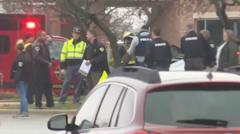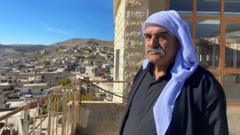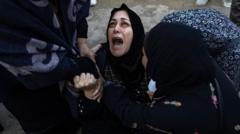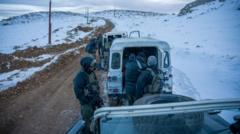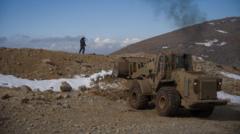At least 15 rescue workers were killed in an Israeli airstrike on an emergency response facility in northeastern Lebanon, marking one of the bleakest moments for Lebanese civil defense amid escalating conflict. The airstrike, which took place in Douris near Baalbek, demolished a building associated with the Lebanese government’s civil defense agency, which functions independently from Hezbollah. The strike claimed the life of the city’s civil defense chief, Bilal Raad, among other emergency personnel.
Israeli Airstrike Claims Lives of 15 Rescue Workers in Lebanon
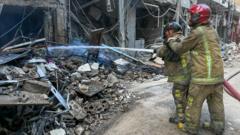
Israeli Airstrike Claims Lives of 15 Rescue Workers in Lebanon
A tragic incident in Lebanon highlights the ongoing conflict, as Israeli airstrikes target emergency responders leading to multiple casualties.
This attack forms part of a worrying trend, as Lebanon's health ministry reports nearly 200 emergency and health workers have been killed since the escalation of hostilities with Hezbollah began in September. Another strike occurred in southern Nabatieh, where six individuals, five of whom were paramedics, died when their civil defense center was similarly targeted.
The Israeli military has not offered any statements regarding these attacks, which have drawn severe condemnation from the Lebanese health ministry, terming them “barbaric.” In the broader context of the conflict, Israeli forces have intensified their air assaults across various regions in Lebanon, including continuous strikes in Beirut’s southern suburbs, which is a known Hezbollah stronghold. This comes alongside attempts at a ceasefire, with American officials presenting a framework to Lebanese authorities for a potential deal.
The Lebanese administration has expressed that any agreements should adhere to United Nations Resolution 1701, a resolution that concluded the 2006 war between Israel and Hezbollah, entailing the removal of Hezbollah fighters and weaponry in specific areas near the Israeli border. Negotiations are ongoing, albeit with cautious optimism, as differences remain in positions, particularly regarding Israel’s demand to retain the right to operate within Lebanon in case of any violations of a prospective deal.
The staggering toll of the ongoing airstrikes signals a catastrophic increase in violence. While Hezbollah has reportedly suffered considerable losses, analysts note that the militant group seems to have regrouped and continues to conduct daily operations against northern Israel, albeit at reduced intensity. Prime Minister Najib Mikati has stressed the importance of reaching a ceasefire and insists that any future agreements must strictly reflect Resolution 1701's original provisions, free from amendments or different interpretations.
This situation raises significant concerns not only for those directly affected but also for regional stability, as civilian infrastructure continues to bear the brunt of military actions and is reported as being largely unsafe.
The Israeli military has not offered any statements regarding these attacks, which have drawn severe condemnation from the Lebanese health ministry, terming them “barbaric.” In the broader context of the conflict, Israeli forces have intensified their air assaults across various regions in Lebanon, including continuous strikes in Beirut’s southern suburbs, which is a known Hezbollah stronghold. This comes alongside attempts at a ceasefire, with American officials presenting a framework to Lebanese authorities for a potential deal.
The Lebanese administration has expressed that any agreements should adhere to United Nations Resolution 1701, a resolution that concluded the 2006 war between Israel and Hezbollah, entailing the removal of Hezbollah fighters and weaponry in specific areas near the Israeli border. Negotiations are ongoing, albeit with cautious optimism, as differences remain in positions, particularly regarding Israel’s demand to retain the right to operate within Lebanon in case of any violations of a prospective deal.
The staggering toll of the ongoing airstrikes signals a catastrophic increase in violence. While Hezbollah has reportedly suffered considerable losses, analysts note that the militant group seems to have regrouped and continues to conduct daily operations against northern Israel, albeit at reduced intensity. Prime Minister Najib Mikati has stressed the importance of reaching a ceasefire and insists that any future agreements must strictly reflect Resolution 1701's original provisions, free from amendments or different interpretations.
This situation raises significant concerns not only for those directly affected but also for regional stability, as civilian infrastructure continues to bear the brunt of military actions and is reported as being largely unsafe.








